Christian Horner: The Motor Sport Interview
Red Bull chief of 20 years, Christian Horner, on Adrian Newey’s achievements, taking risks with young drivers and making your own luck
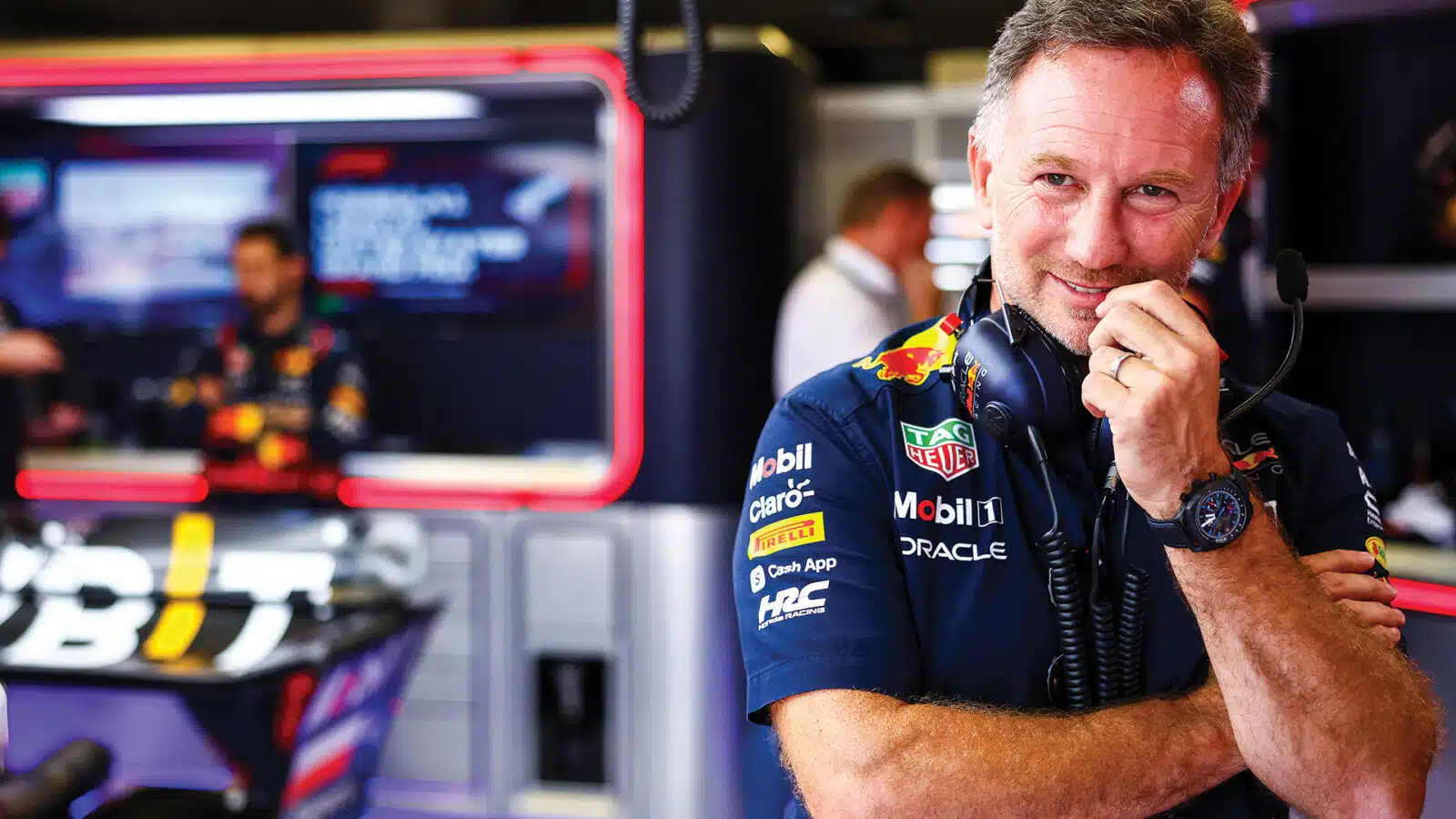
Getty Images
Christian Horner marks 20 years as team principal of the Red Bull Formula 1 team this year, flying high off four consecutive driver’s world championships for Max Verstappen. But we’re catching up with him in the wake of what also must have been among the most torrid years of his life, and with major question marks hanging over the state of Red Bull’s team heading into 2025 and beyond.
The 51-year-old rode out the storm regarding his alleged behaviour towards a female employee, a humiliating episode from which he was exonerated, first by an independent enquiry and then following an appeal. Meanwhile, he manoeuvred his way through high tension with Red Bull’s voluble senior adviser Helmut Marko and Max’s father, Jos Verstappen; parried the blow of losing his long-time ally Adrian Newey to Aston Martin; and grappled with an alarming drop in on-track form. It was just as well Verstappen won seven of the first 10 races in 2024, given the subsequent four-month victory drought. Red Bull not only lost its constructors’ crown, it also dropped to third in the standings behind McLaren and Ferrari.
Now what? Without Newey, can the team regain its winning mojo? And as engine supplier Honda prepares to depart for Aston Martin ahead of the next ruleset in 2026, will Red Bull’s Ford-backed but independently built powertrain prove potent enough to keep the talismanic Verstappen from waltzing away from Milton Keynes? Characteristically, Horner plays a straight bat as he looks ahead and reflects on the triumphs and turbulence at F1’s crease.
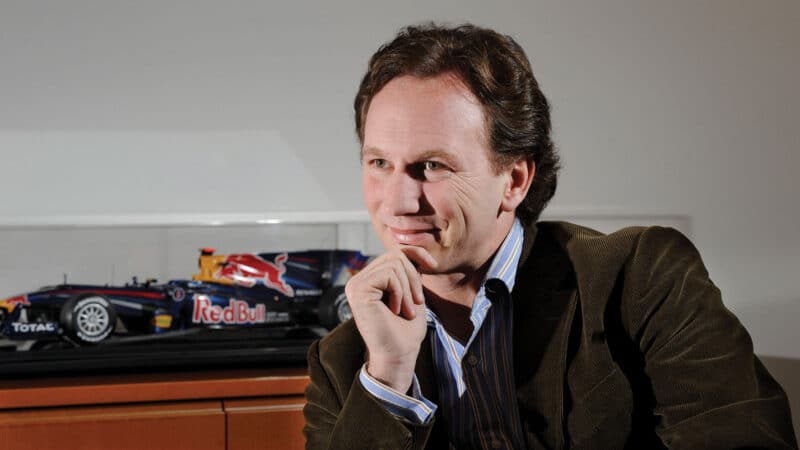
Christian Horner at the Milton Keynes HQ in early 2011 – when there was no stopping Red Bull
Motor Sport: In January you celebrated 20 years as team principal of Red Bull. Does it feel like 20 years?
CH: Twenty years, it’s a long time. In some ways it feels like 20 years, and in other ways it feels like half that. And if I look and see how the business has evolved in that time, and F1 has evolved, it’s unbelievable.
Heading into this season you have a new structure – Adrian Newey is not around – and you also have to look at 2026. What are the challenges that you’re facing?
CH: Adrian played a key role during the period that he was with us, on which we’ll always look back with great affection and fondness and gratitude, but the team was already evolving. And, yeah, it’ll be strange to see him after 19 years in a green team kit. Everything keeps evolving. Adrian had taken more of a back seat in recent years, but this is the first year without him involved at all. So the rest of the group are getting on with the job, and I think we’ve got great strength and depth. There’s also evolution in the race team, and in the way that we’re going racing as well. And it’s great to see young talent getting an opportunity. Like in any organisation, if you remain stagnant, then things can go off the ball a little. We’ve always been a very progressive F1 team. Of course, it’s the last year of the current regs, and then behind the scenes it’s a big, big year for Red Bull Powertrains, gearing up to supply two teams in 2026 with Ford. So a lot going on.
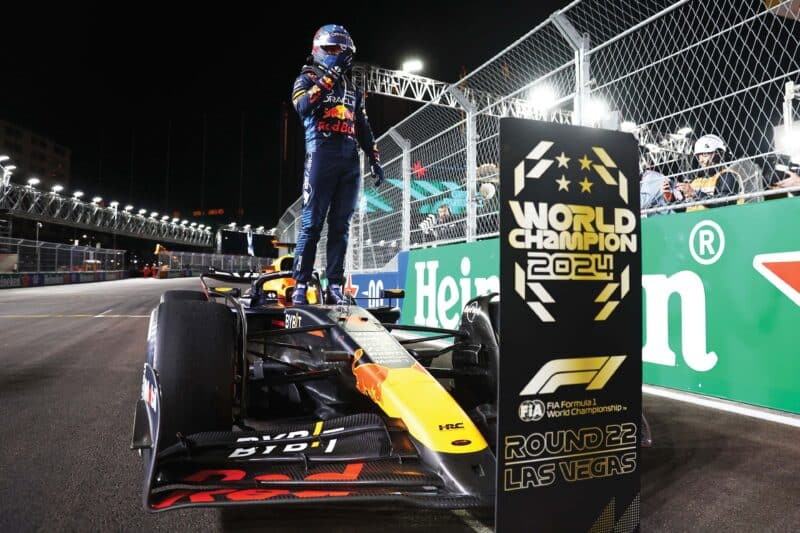
Max Verstappen made it four world titles in as many years in Las Vegas last season after finishing fifth in the race – but Red Bull’s dominance had ended
Is there a feeling that in 2025 you’ve really got to bag Max’s fifth championship because 2026 is going to be that much harder? Nobody knows how good the new Honda, Ferrari or Mercedes PUs will be, but there are bigger question marks over both your PU and Audi’s.
CH: Twenty twenty-five will be a massively competitive season. Last year you saw the convergence between four teams. There’ll be eight drivers who could be fighting for wins from the first race this year if it’s a continuation from the back end of ’24, with stable regs. I think that’s a good thing for F1, but it adds the pressure internally to capitalise on every point, every grand prix.
“There’ll be eight drivers who could be fighting for wins this year”
Then ’26 for us is a complete reset. And there has to be a complete readjustment of expectations, because for the first time we become an engine supplier and manufacturer, and that’s an enormous undertaking, and absolutely it is a long-term project that will pay dividends. But there will be, inevitably, some growing pains, which you get with any young organisation.
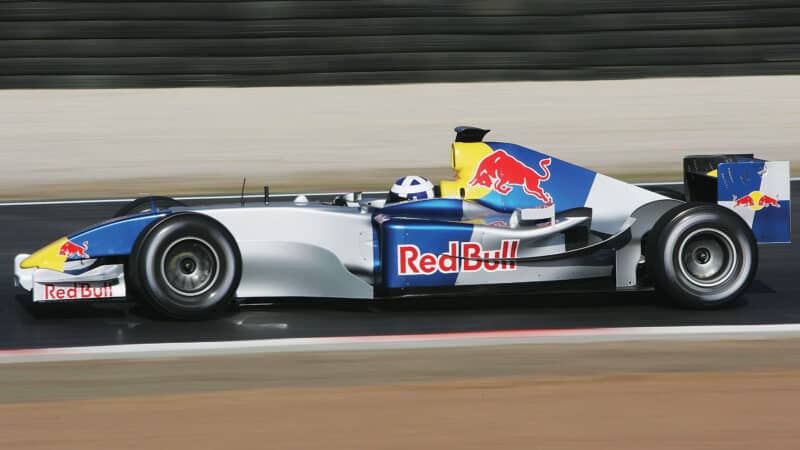
David Coulthard driving a Jaguar in Red Bull colours at the end of 2004 – he was a key ally for Horner when he first arrived at the team
Getty Images
Going back to the beginning, you were exploring an Arden F1 project at one stage. How close did you get?
CH: Bernie was pushing me very hard at the time, because Eddie Jordan was wanting to exit. I think Bernie wanted to bring new blood into F1, and he was championing me very hard to take on the entry. But at the same time, I sat down with Dietrich [Mateschitz, the late Red Bull co-founder and co-owner], who was also exploring options in F1, and Jaguar looked to be their primary option. When the Jordan deal disintegrated Dietrich then asked if I’d like to get involved in Red Bull as he wanted to change the management.
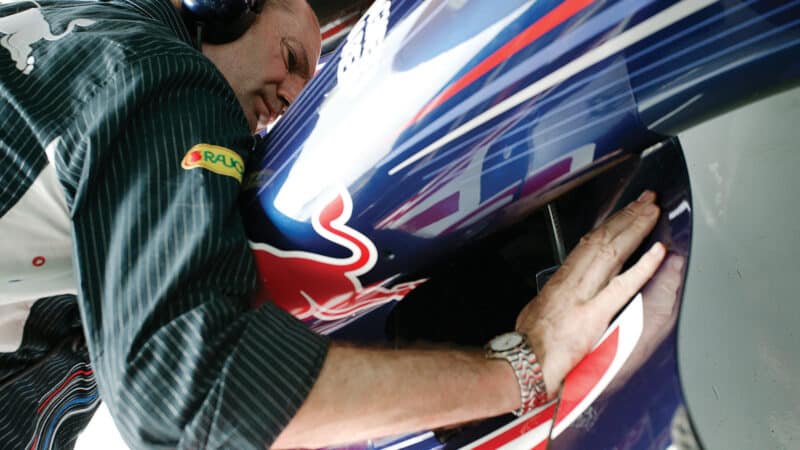
Adrian Newey with Red Bull’s RB3, 2007.
Getty Images
There had been a revolving door of Jaguar bosses – Bobby Rahal, Niki Lauda, Tony Purnell and so on. You came from F3000…
CH: Yes, I turned up as a fresh-faced 31-year-old, and I’m sure within the team they probably thought, “Oh, here’s the next one.” Every six to 12 months there was a change in management. And you could see people had become battle weary through that, and everybody was just keeping their head down. That’s unhealthy in any organisation. They probably thought, “Who’s this young kid?”
What did you find when you arrived in Milton Keynes in January 2005?
CH: You could just see that it was a team that was disjointed. It lacked technical direction. There were pockets of capability, but none of it was joined up. And the first thing I focused on was getting back to basics and trying to implement a race team culture. I was fortunate that David Coulthard came on board at the same time. I’d known David for many years. He was someone that I could really trust and bounce ideas off, and compare with his experience from McLaren and Williams.
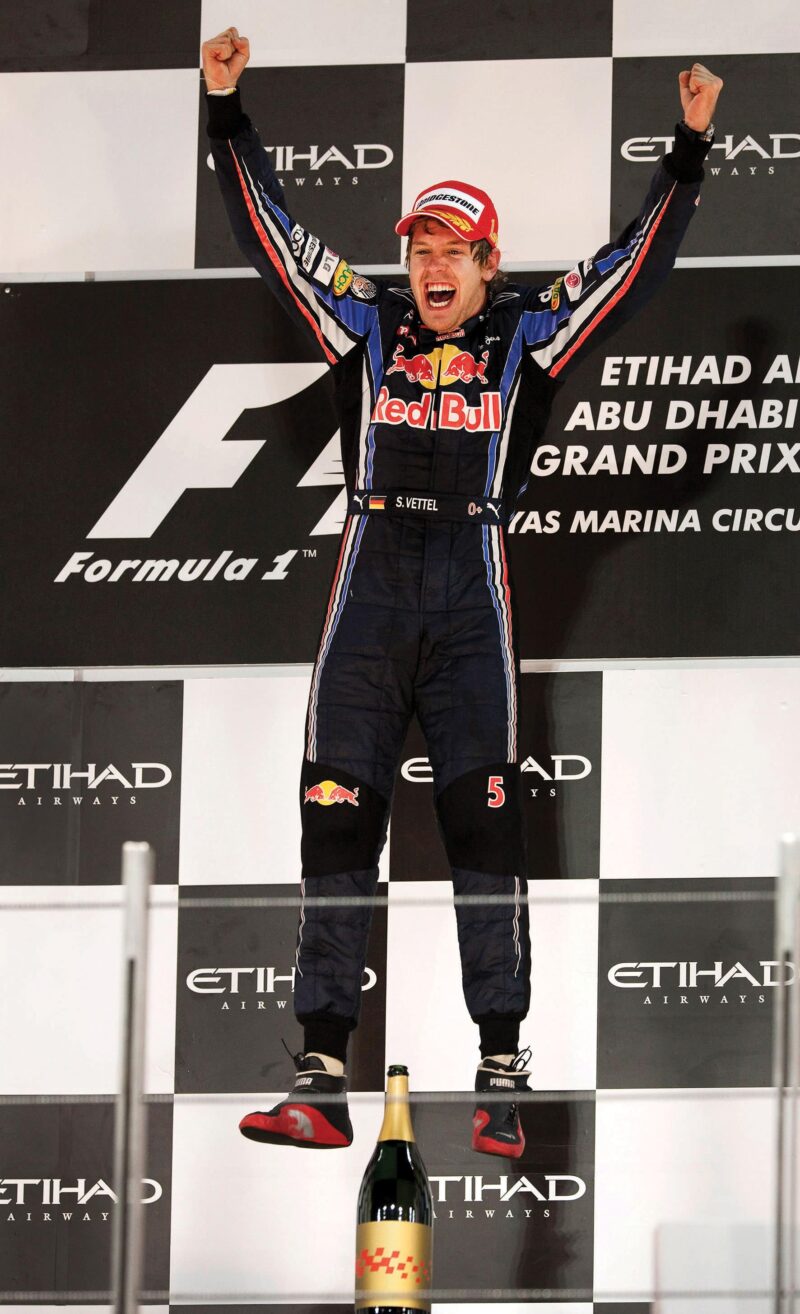
Sebastian Vettel, Abu Dhabi, 2010 – Red Bull’s first champion
Getty Images
What was the first step? You’d gone from an organisation of 25 people to several hundred, and you had to get them onside.
CH: It was circa 400 at that point. I spent the first couple of months looking and listening and understanding what the issues were before trying to work out which were the first bits to attack, what needed doing. The technical direction was the bit that was abundantly missing. The three fundamental engineering functions were all working somewhat independently – aero, vehicle dynamics, and the design office, they were all different. I think that’s when identifying Adrian, and convincing Adrian to come on board, was crucial. Then putting a structure in place with Rob Marshall.
Was Adrian’s arrival welcomed, given that sometimes incumbent staff don’t like newcomers? Or did people realise that this guy knows how to win?
“The first thing I focused on was trying to implement a team culture”
CH: The head of aero told me that Adrian was going to have to fit in with the processes that Jaguar had. I’m not going to disclose the name! But I remember having the debate: “Adrian is the most successful designer in history. You’re going to have to fit in with him, as opposed to the other way round. He’s not working here as a consultant, he’s setting the tempo and the direction.”
It was a sea change, but it was bringing that racing culture that was so important. As soon as Adrian was announced people sat up and took notice. “If Adrian Newey is prepared to go there, they must be serious.” And so that opened the door for Peter Prodromou to come on board, and some other key members.
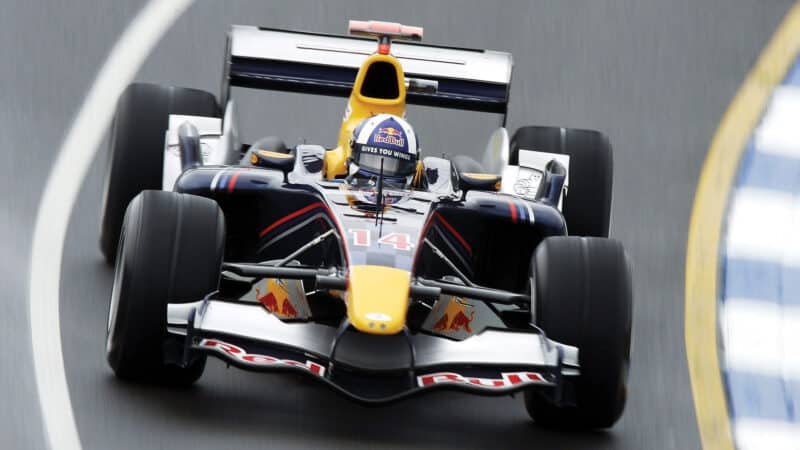
2005 – Red Bull’s debut season
Getty Images
You had Cosworth engines initially, then Ferrari, then you targeted Renault…
CH: The Ferrari engine was never wanted. And it was quite clear that the Renault V8 at the time was the engine, and it was exclusive to Renault. They didn’t supply a customer team. Then we were able to start building RB3 around that for 2007, which was such a big transition. The team weren’t ready for Adrian at that point. We’d gone to a seamless shift gearbox, the aerodynamics of the car just looked completely different. Our tools weren’t up to it, our manufacturing qualities weren’t up to it. It was a year dogged with reliability issues, but the car still managed to bag a couple of podiums and showed promise, particularly in the second half of the year.
You were gradually putting all the pieces together. A key one was waiting for the right driver to come along in Sebastian Vettel.
CH: The regulation change for 2009 was bigger, and that having got the orchestra together, we could suddenly start writing good music for the new regs. That coincided with Sebastian coming through Toro Rosso and demonstrating what a talent he was.
That season, 2009, is remembered for Brawn GP. However, you became race winners and the team to beat by the end of the year.
CH: It was frustrating because we got caught between the politics of what was going on at a higher level, and the double diffuser. Trying to argue that a hole wasn’t a hole it was a slot was frustrating. That was just a power play between the FIA and the teams and Bernie. We sort of got caught in the crossfire. But we had a really quick car, and even on a single diffuser we were able to win our first race in China. That was a massive moment.
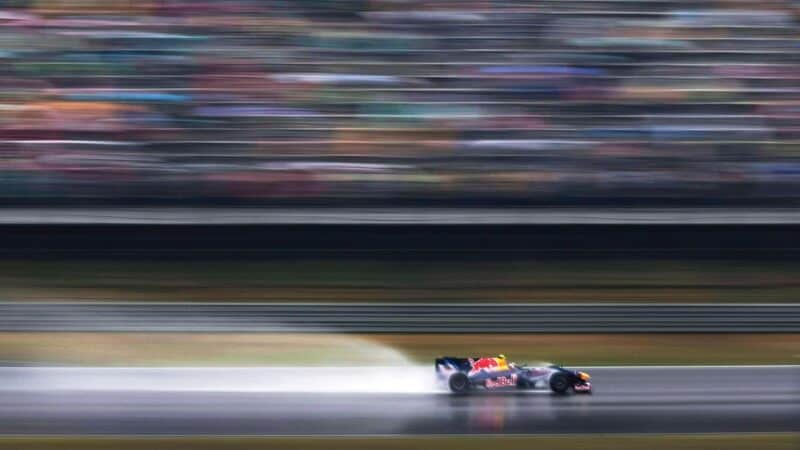
While McLaren and Ferrari spluttered in 2009, Red Bull was making waves – with Vettel taking four wins, including here at China
Getty Images
The first championship followed, and Seb won it in style.
CH: Doing it in Abu Dhabi in 2010, going all the way to the wire… Sebastian had been outstanding that year, but again, we were a young team and we were making a few mistakes. The car hadn’t been reliable, there were a couple of engine blow-ups as well that cost us dear, sparkplugs in Bahrain in the first race and whatever else. He should have smashed that championship. Four of them could win it in Abu Dhabi, and against the odds, Sebastian came through. It was the only time he led the championship.
Then three more championships for Seb – some more dominant than others?
CH: In 2011 we were a better team. We learned from ’10, and we were dominant in ’11. In 2012 there was a regulation change over the blown diffuser. And it took a while to sort that out. Sebastian had only won one race when we left Europe. Then he won four in a row and brought himself back into that championship. Another showdown in Brazil at the final race, and that played out. Then ’13 was again hugely dominant for us, before the massive engine regulation change for 2014.
When the hybrid era started were you totally in Renault’s hands?
CH: It was clear that they hadn’t committed enough, early enough. I remember going to Paris with Adrian and then again on my own on a couple of occasions to see Carlos Ghosn to plead with him to put more resources into 2014. I just got a response that Renault know how to do turbo engines. What turned up in 2014 was two years behind the Mercedes.
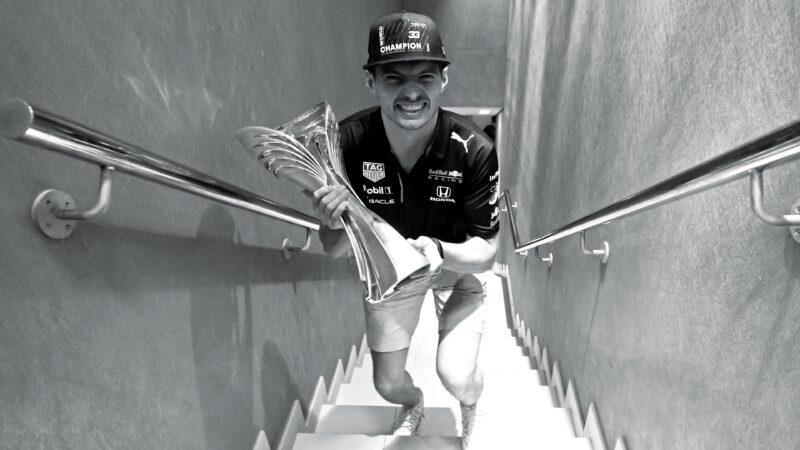
If the cap fits: Verstappen, Abu Dhabi, 2021 – a new world champion, and another gem of a driver for Horner
A team needs a special driver to really be consistently successful. To have Seb followed by Max’s arrival in mid-2016, you were blessed.
CH: I think you make your own luck. We were brave enough to put Max in a race seat in Toro Rosso, and credit to Helmut for spotting his talent at a young age. That was helped by the fact that Mercedes was showing an interest with Niki [Lauda]. It became a personal competition between the two of them to get him signed up. From my perspective, we were just keen to get him in the car at the soonest and most relevant opportunity.
Switching to Honda for 2019 was a leap of faith, but it transformed everything, and led to the first title for Max.
CH: McLaren kicked them out, and Fred Vasseur had turned down the Honda deal at Sauber. We were able to put Honda into Toro Rosso for a year to have a look. You could see the commitment, the passion and the resource that was available. By Montreal that year it was a clear decision to switch. Suddenly, bang, we were back in it. The key thing for us during that difficult period was we won races every year, apart from 2015. And we took the opportunities that we could. So as soon as we got that missing ingredient, we were back in the game again. And Max’s emergence at the same time, coming through, you could feel the momentum building.
How big an achievement was Max’s first title in 2021?
“Nobody was more frustrated than Checo with how the season went”
CH: Seeing Max grow and develop, joining us as a teenager, he was obviously always a truly outstanding talent. Then it just needed us to give him the tools to be able to recognise and deliver on that talent after we got a competitive engine in the car. That first championship in ’21 was one of the most iconic seasons in F1, going all the way to that final race. It was like a heavyweight fight from the first round in Bahrain to Abu Dhabi. That was just massive, and definitely the highlight of our history as a team. Then backing that up with a dominant win in ’22 and then an unbelievable season in ’23 really cemented his place among some of the greatest names in the sport. And I think he richly deserves that.
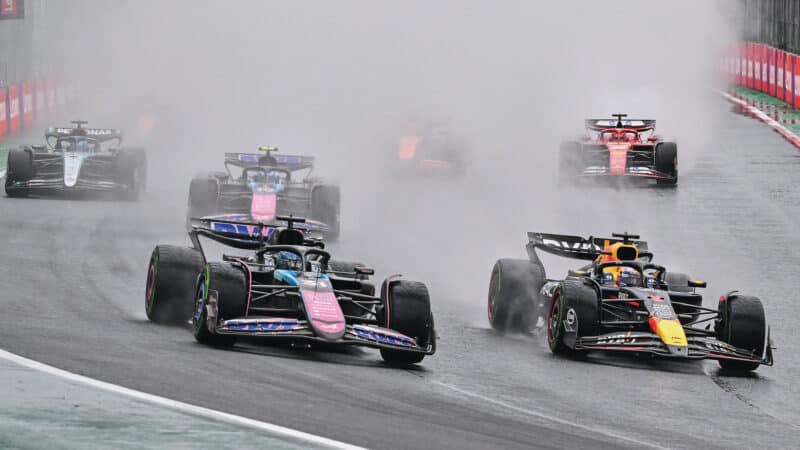
Verstappen pulled off one of the greatest comebacks in F1 history at São Paulo last November
Getty Images
Last year had its ups and downs, but Max got there in the end. What are your memories of the season?
CH: You’ve got the standout moments of the nine victories, the four sprint wins, the eight poles. But of course, it was a much tougher season. The competition caught up. And we had a difficult summer. I thought Max was outstanding. He was able to extract every ounce of performance out of the car, and drove with maturity. On the days that he couldn’t win he bagged the points, he still brought in the seconds and thirds. His drive in Brazil will go down in F1 folklore. The team never gave up, they kept their heads, and kept fighting.
Was it frustrating that at least the first part of the year was overshadowed by all the stuff that was going on in the background? How hard was it to just get on with the job?
CH: I think as soon as everybody walks in that garage, they were just focused on going racing, and that’s how it operated.
There’s a big change for this year as Liam Lawson replaces Sergio Pérez. The driver saga dragged on for quite a while at the end of last year. What are you able to say about how that unfolded, and what is Liam’s potential?
CH: Red Bull has had a history of changing rapidly. We broke that mould with Checo, where we did our best to support him. Nobody was more frustrated than Checo with how the season went. But it got to a stage that it was better for all to find another way forward.
In Liam we’ve got a driver who has great mental strength and who has shown good speed and aptitude in the races he did with VCARB, and certainly impressed the engineers here. It’s the toughest seat in F1. He’s got the right mental attitude to deal with that. We’ll do our best to support him. He’s a young guy, only 11 grands prix, but in what we’ve seen so far, he drives a car in a similar fashion to Max. I think he’s the right guy for the job.
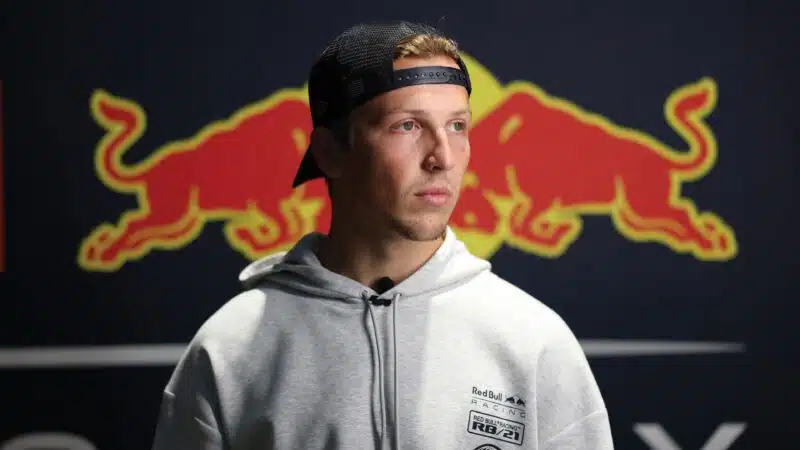
Could Liam Lawson be the first Kiwi to win an F1 race since Denny Hulme in the ’74 Argentine GP?
It was your decision, together with Helmut and Dietrich, to pursue your own PU for 2026. It was always a gamble. Is there a little bit of stress for you there?
CH: As Dietrich would always say, “no risk, no fun”. The size of the team that we have, the competitiveness that we have, we couldn’t be dependent on third-party suppliers that could withdraw at any point or change their mind. And so very much it’s taking control of our destiny. The shareholders have been tremendously supportive with this, and the investment that’s been placed into building a state-of-the-art facility – to have everything on one campus, we’re the only team to have that other than Ferrari. It’s provided opportunity for a huge number of engineers and talent in the UK. It’s an exciting project. Of course, it’s a project that’s not without risk and its challenges. But that’s what Red Bull has never been afraid of taking on.
We are all wondering what Max’s plans are. He’s has a contract till 2028, but at this stage of his career he doesn’t necessarily want to be part of a project with growing pains.
CH: I think he believes in and buys into the project. There’s no guarantees for anybody in 2026. That’s what’s going to be interesting, to see how it all plays out.
